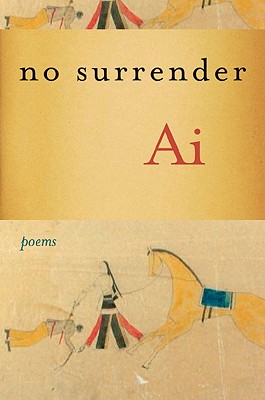Book Review: No Surrender: Poems
Reviewed by:
Robert FlemingWhen news reached me about the death of renowned poetess, Ai, I knew that I must write something about her and her unwavering lyrical examination of the human condition in America. Her last collection, No Surrender, will be released in the fall and it is an occasion to pay her tribute.
Ai was always a fierce and uncompromising voice. The author of seven
memorable books of poetry, she earned the American Book Award for Sin in
1987 and a National Book Award for Vice in 1999. As the Mitte Chair in
Creative Writing at Southwest Texas State University from 2002 -2003, she
earned a United States Artist Ford Fellowship in 2009.
She wrote the following collections of poetry: Cruelty (1973), Killing Floor
(1979), Sin (1986), Fate (1991), Greed (1993), Vice- New and Selected Poems
(1999), and Dread (2003). The poetess also wrote one novel, Black Blood
(1997), as well as numerous articles and poems to several publications.
Unlike some of her early work which probes the sense of isolation and
alienation of the downtrodden and desperate, her later poems examined the
motives and other parts of the internal terrains of the historical and
cultural figures such as Marilyn Monroe, Jimmy Hoffa, Elvis Presley, J.
Edgar Hoover, JFK, and James Dean. However, with No Surrender, she turns her
gaze closer to home with the themes of family, religion, addiction, gender
roles, race, trust, feminism, sexual irresponsibility, and malice.
Critics acknowledge her as a master of searing poetic monologues, but they
criticized her for being emotionally dour and too cynical. However, she
remains bold and brave in speaking through her characters, standing up to
the microphone and telling the truth. Sometimes it’s a bitter, refreshing
truth as in the moral guilt of a young unwed mother in "Motherhood 1951:"
I’m pregnant again.
I know I’ve sinned
But I am paying for it.
Don’t make my girl suffer
Because her mother used poor judgment
And got herself in trouble out of wedlock.
In Ai’s final collection, she examined her life, her family tree, her
existence as a woman and writer, and her profound effect on other people.
She used the same penetrating gaze on herself that she had used on her other
subjects, both deconstructing her sexual and racial identity and then
reinventing them. She knew her power. She never wallowed in pity or regret
and applied the same narrative rules to herself as she did to others. That
was her supreme strength. That was what made her a singular voice in
American poetry.
It’s ironic that the last poem, "The Cancer Chronicles" closes the door on
this brilliant career. She died of complications of an undiagnosed cancer.
These words ring so true and exact in Ai’s final glorious act of letters:
Yet she lingered as sometimes the dying must
To further their endless torment
As if it weren’t enough that they knew all too well
Life was limited and unjust.


